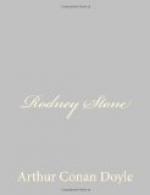“It still bears the stain,” said I.
I know not which of the three was the more astonished, for my mother had not heard of my adventures of the night. They never took their wondering eyes off me as I told my story, and my heart swelled with pride when my uncle said that we had carried ourselves well, and that he did not think that many of our age would have stood it as stoutly.
“But as to this ghost, it must have been the creature of your own minds,” said he. “Imagination plays us strange tricks, and though I have as steady a nerve as a man might wish, I cannot answer for what I might see if I were to stand under that blood-stained ceiling at midnight.”
“Uncle,” said I, “I saw a figure as plainly as I see that fire, and I heard the steps as clearly as I hear the crackle of the fagots. Besides, we could not both be deceived.”
“There is truth in that,” said be, thoughtfully. “You saw no features, you say?”
“It was too dark.”
“But only a figure?”
“The dark outline of one.”
“And it retreated up the stairs?”
“Yes.”
“And vanished into the wall?”
“Yes.”
“What part of the wall?” cried a voice from behind us.
My mother screamed, and down came my father’s pipe on to the hearthrug. I had sprung round with a catch of my breath, and there was the valet, Ambrose, his body in the shadow of the doorway, his dark face protruded into the light, and two burning eyes fixed upon mine.
“What the deuce is the meaning of this, sir?” cried my uncle.
It was strange to see the gleam and passion fade out of the man’s face, and the demure mask of the valet replace it. His eyes still smouldered, but his features regained their prim composure in an instant.
“I beg your pardon, Sir Charles,” said he. “I had come in to ask you if you had any orders for me, and I did not like to interrupt the young gentleman’s story. I am afraid that I have been somewhat carried away by it.”
“I never knew you forget yourself before,” said my uncle.
“You will, I am sure, forgive me, Sir Charles, if you will call to mind the relation in which I stood to Lord Avon.” He spoke with some dignity of manner, and with a bow he left the room.
“We must make some little allowance,” said my uncle, with a sudden return to his jaunty manner. “When a man can brew a dish of chocolate, or tie a cravat, as Ambrose does, he may claim consideration. The fact is that the poor fellow was valet to Lord Avon, that he was at Cliffe Royal upon the fatal night of which I have spoken, and that he is most devoted to his old master. But my talk has been somewhat triste, sister Mary, and now we shall return, if you please, to the dresses of the Countess Lieven, and the gossip of St. James.”




